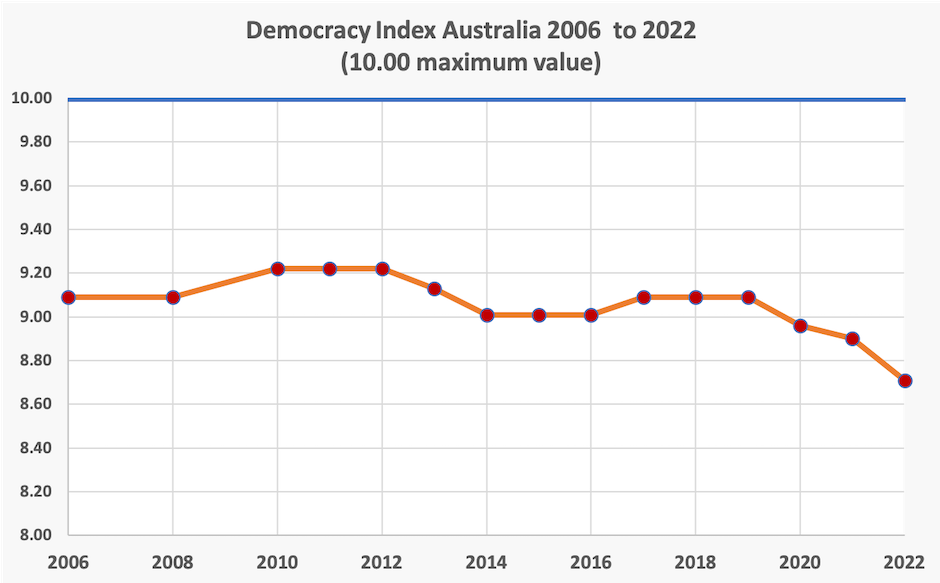Politics and polls
Democracy – Australia slips on the Economist Intelligence Unit poll
The Economist Intelligence Unit has published its Democracy Index 2022: Frontline democracy and the battle for Ukraine. You can watch a short but dramatic YouTube summary, or register with the EIU for the full report.
To quote from that report:
From a global perspective the year 2022 was a disappointing one for democracy, given expectations that there might be a rebound in the overall index score as pandemic-related prohibitions were lifted over the course of the year. Instead, the average global score stagnated. At 5.29 [out of 10.00], it scarcely improved from the 5.28 recorded in 2021. This leaves the index score well below the pre-pandemic global average of 5.44, and even further below the historical high of 5.55 recorded in 2014 and 2015 (and also in 2008, just before the global financial crisis).
As usual, the Nordic countries and New Zealand occupy the top ranks. Australia comes in at position #15, six places down from last year. We earn top marks for “electoral processes and pluralism”, but are marked down for “political participation” and “political culture”.
As the term suggests, “political participation“ is about the extent to which citizens are engaged politically. Even the USA, which comes in poorly overall at position #30, does better than Australia on this dimension.
“Political culture” is more about trust in government and institutions, and is brought down in countries with a high degree of political polarization. The USA ranks very poorly on political culture. We do much better than the USA, but not as well as the strongest democracies.
Australia’s “democracy index”, as it has been calculated by the EIU since 2006, is shown in the graph below. Note the drops in 2013 corresponding with the election of the Abbott government and in 2019 corresponding with Morrison’s electoral success.

Also related to the quality of our democracy, the 2023 Lowy Institute Poll tracks Australians’ responses to three statements about democracy, covering the period 2012 to 2023. These statements, with their corresponding percentages in agreement, are:
Democracy is preferable to any other kind of government (73 percent).
In some circumstances, a non-democratic government can be preferable (19 percent).
For someone like me, it doesn’t matter what kind of government we have (7 percent).
Democracy has gained support over this period (from 60 to 70 percent), while indifference (the third statement) has fallen (from 15 to 7 percent).
Centre for Independent Studies – a bleak future for the Coalition
Winston Churchill said “If a man is not a socialist by the time he is 20, he has no heart. If he is not a conservative by the time he is 40, he has no brain”.
Polling and election results in Australia seemingly confirm that view. Australians aged under 50 or 60 are mainly Labor and Greens supporters, while Coalition voters are older.
The ANU’s Election Study and other polls reveal that this model of voter switching no longer holds, however. As people age they no longer shift their political support to parties on the right.
Drawing on those studies and polls, the Centre for Independent Studies has projected this development into the future: Generation Left: young voters are deserting the right. It tentatively concludes that:
… generational change could see the Coalition’s Average Primary Vote across lower house electorates fall by 9.1 percentage points over the course of the next six electoral cycles. This reduction in primary vote is simulated to result in a 35-seat reduction in Coalition seats in the House of Representatives by 2040.
It’s a well-researched mathematical study, using standard statistical methods of projection. Only in passing does it mention reasons why people are hanging on to their voting patterns as they age. Such political analysis will be the subject of later studies.
Maybe when they do those later studies they will confirm that Churchill was actually right. Perhaps, as they age, Australians come to see the Coalition not as a “conservative” party, but as a hard-right movement contemptuous of conservative traditions – respect for the scholarship and the truth, respect for democratic institutions, a sense of public purpose, and a commitment to sustain the common wealth. Labor seems to more easily fit the Burkean model of conservatism.
Lowy Institute poll
The 2023 Lowy Institute Poll is mainly concerned with Australians’ views and attitudes about foreign relations, security and defence matters.

USAF B52: It it really a peacekeeper?
Australians’ attitude to the Chinese government remains one of suspicion and mistrust, and most believe China sometime in the near future will pose a military threat to Australia.
There is strong support for the US alliance, even though most Australians believe it increases the likelihood of being drawn into a war in Asia. There is strong but declining support for AUKUS and its submarine program.
In response to a question on confidence in world leaders, Volodymyr Zelenskyy comes out on top, with Kim Jong-un at the bottom. There is strong support for aid to Ukraine and sanctions against Russia.
Asked what countries are trusted to act responsibly in the world, Japan and the UK come out on top, with France not far behind. Trust of the US is lower, but still well ahead of trust of China.
The Albanese government gets high marks for its handling of foreign policy. Out of recent prime ministers Abbott and Morrison get very poor marks, and in retrospect many people have improved their assessment of the Gillard government.
On public spending priorities, health and education come out on top – even more strongly than in 2022. Support for spending on defence, border protection and foreign aid is down.
Even though there has been some fall in recent years, 62 percent of Australians are optimistic about Australia’s economic performance over the next five years.
Essential poll
The latest Essential poll shows a sharp turndown in the public’s assessment of the government, but that is not to the benefit of the opposition. That is, unless we consider the “opposition” to comprise representatives and senators from so-called “minor” parties and independents, rather than the remnants of the Liberal and National parties representing an ageing “white” and minimally-educated demographic.
Australians believe that government is “not doing enough” to relieve cost of living pressures, to ensure rentals are affordable and secure, and to ensure that the income tax system is fair. The public may still be blaming the former Coalition government for having left the economy in a mess (a valid assessment), but they are now impatient with the Labor government for not doing enough to fix it.
Notably an increasing proportion of Australians believe Australia is heading off on the “wrong track”. Polling does not reveal what people believe comprises the “right track’, however.
A set of questions on environmental issues reveals that they are important to the electorate – very few say the government is doing “too much” – but Australians are more concerned about protecting endangered species, and preserving oceans, rivers and native forests, rather than taking measures to deal with climate change. The issues of concern to Australians are ones with “here and now” manifestations. Younger people, however, reveal different priorities: “mitigating against the effects of climate change” is their top priority. Predictably, but disappointingly, there are sharp partisan divisions in relation to concern for the environment. Coalition supporters seem to be “conservative” in their attachment to failed economic ideas, but not in relation to the environment.
Essential tracks support for a Voice. Unlike some other polls, cited with glee in the Murdoch media, it does not reveal a steady slide in support for a “yes” vote. Rather, around the beginning of the year, support slipped from around 65:35 to around 60:40, and has stayed at that level. In line with other polls support seems to be strongest and steadiest in Victoria and New South Wales, but there are highly variable results from other states (where the outcome could be determined because of the “majority of states rule”). This suggests that sample sizes in those states are too small to be meaningful.